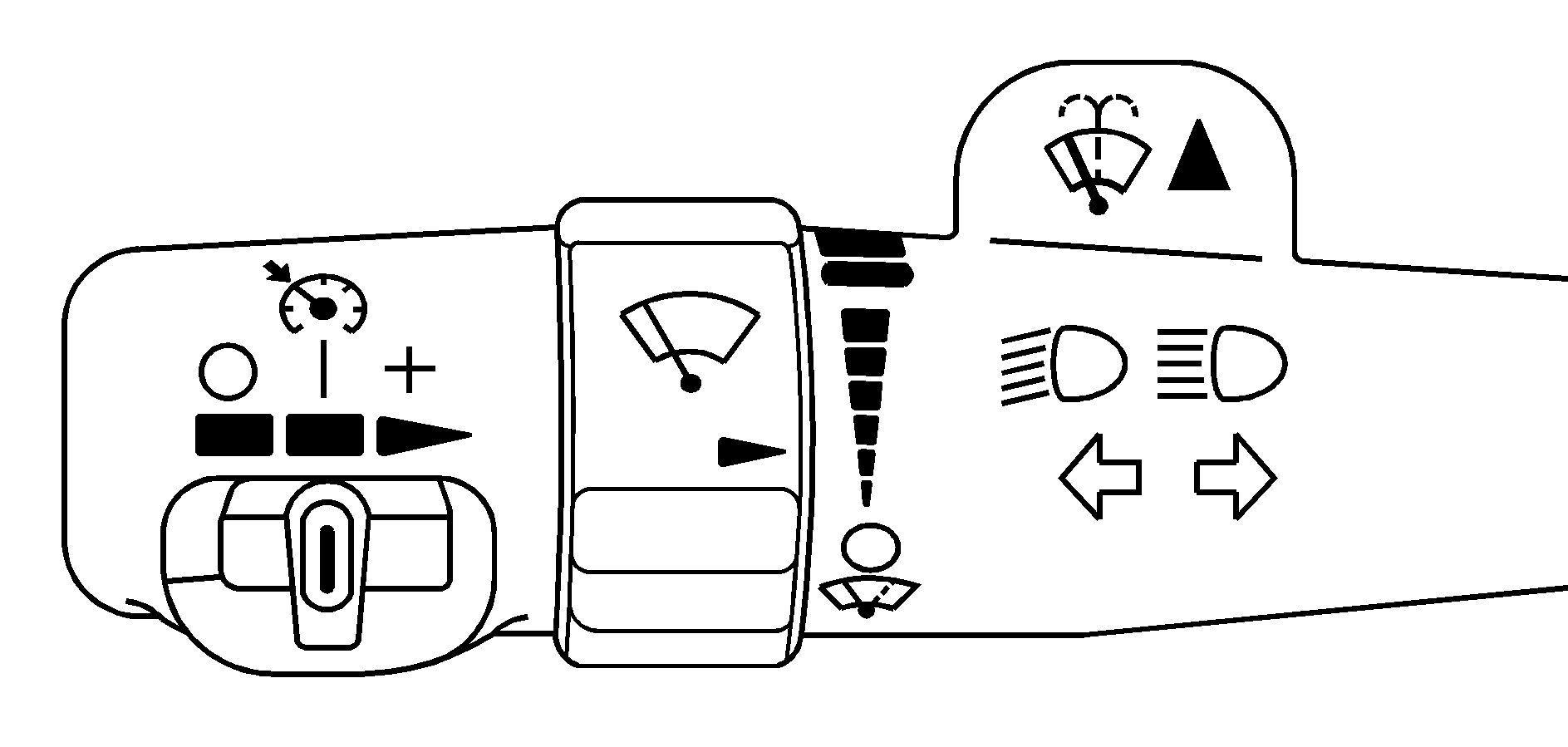
The lever on the left side of the steering column includes the following:
| • | Turn and Lane Change Signals |
| • | Headlamp High/Low-Beam Changer |
| • | Flash-to-Pass |
| • | Windshield Wipers |
| • | Windshield Washer |
| • | Cruise Control |
For information on the exterior lamps, see Exterior Lamps .
Turn and Lane Change Signals
The turn signal has two upward (for right) and two downward (for left) positions. These positions allow you to signal a turn or a lane change.
To signal a turn, move the lever all the way up or down. When the turn is finished, the lever will return automatically.
To signal a lane change, just raise or lower the lever until the arrow starts to flash. Hold it there until you complete your lane change. The lever will return by itself when you release it.
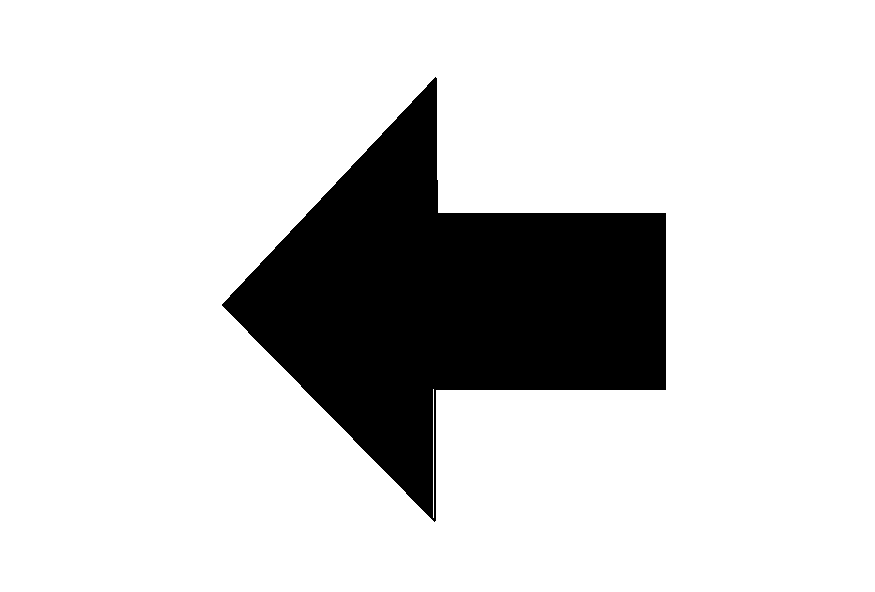
An arrow on the instrument panel cluster will flash in the direction of the turn or lane change.
As you signal a turn or a lane change, if the arrows flash more quickly than normal, a signal bulb may be burned out and other drivers won't see your turn signal.
If a bulb is burned out, replace it to help avoid an accident. If the arrows don't go on at all when you signal a turn, check for burned-out bulbs and a blown fuse. See Fuses and Circuit Breakers .
Turn Signal On Chime
If your turn signal is left on for more than 3/4 of a mile (1.2 km), a chime will sound at each flash of the turn signal and the message TURN SIGNAL ON will also appear in the DIC. To turn the chime and message off, move the turn signal lever to the off position.
Headlamp High/Low-Beam Changer
(Headlamp High/Low Beam Changer): To change the headlamps from low to high beam, push the lever toward the instrument panel. To return to low-beam headlamps, pull the multifunction lever toward you. Then release it.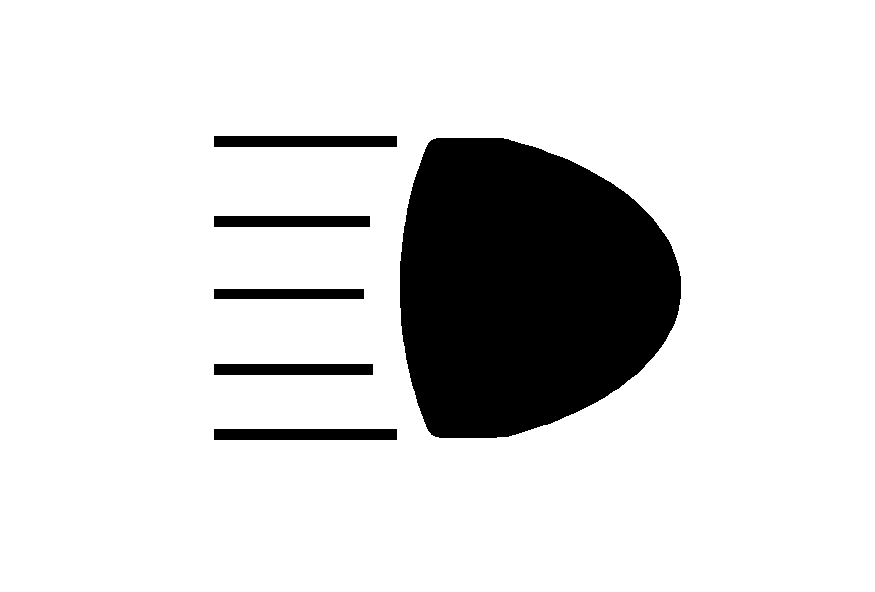
When the high beams are on, this indicator light on the instrument panel cluster will also be on.
Flash-to-Pass
This feature lets you use your high-beam headlamps to signal a driver in front of you that you want to pass. It works even if your headlamps are in the automatic position.
To use it, pull the turn signal lever toward you, then release it.
If your headlamps are in the automatic position or on low beam, your high-beam headlamps will turn on. They'll stay on as long as you hold the lever toward you. The high-beam indicator on the instrument panel cluster will come on. Release the lever to return to normal operation.
Windshield Wipers
You control the windshield wipers by turning the band with the wiper symbol on it.
(Mist): For a single wiping cycle, turn the band to mist. Hold it there until the wipers start. Then let go. The wipers will stop after one wipe. If you want more wipes, hold the band on mist longer.(Delay): You can set the wiper speed for a long or short delay between wipes. This can be very useful in light rain or snow. Turn the band to choose the delay time. The closer to the top of the lever, the shorter the delay.
(Low Speed): For steady wiping at low speed, turn the band away from you to the first solid band past the delay settings. For high-speed wiping, turn the band further, to the second solid band past the delay settings. To stop the wipers, move the band to off.
(High Speed): For high-speed wiping, turn the band further, to the second solid band past the delay settings.
(Off): To stop the wipers, move the band to off.
Be sure to clear ice and snow from the wiper blades before using them. If they're frozen to the windshield, carefully loosen or thaw them. If your blades do become worn or damaged, get new blades or blade inserts.
Windshield Washer
(Washer Fluid): There is a paddle marked with the windshield washer symbol at the top of the multifunction lever. To spray washer fluid on the windshield, push the paddle. The wipers will clear the window and then either stop or return to your preset speed.Caution: In freezing weather, do not use your washer until the windshield is warmed. Otherwise the washer fluid can form ice on the windshield, blocking your vision.
Rear Window Washer/Wiper
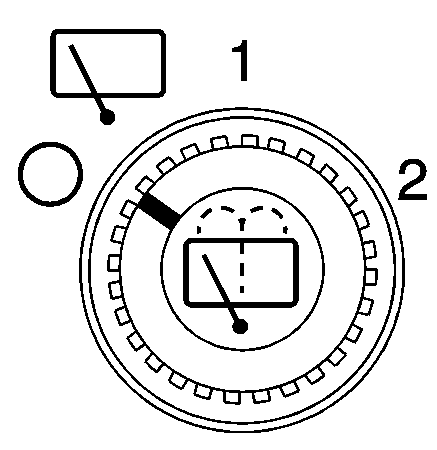
This knob is located on the instrument panel to the left of the steering wheel.
To turn the rear wiper on, turn the knob to either 1 or 2. For long delayed wiping, turn the knob to 1. For short delayed wiping, turn the knob to 2
(Off): To turn the wiper off, turn the knob to this symbol.(Washer Fluid): To wash the window, press the knob with this symbol. The rear window washer uses the same fluid bottle as the windshield washer. However, the rear window washer will run out of fluid before the windshield washer. If you can wash your windshield but not your rear windows, check the fluid level.
Cruise Control
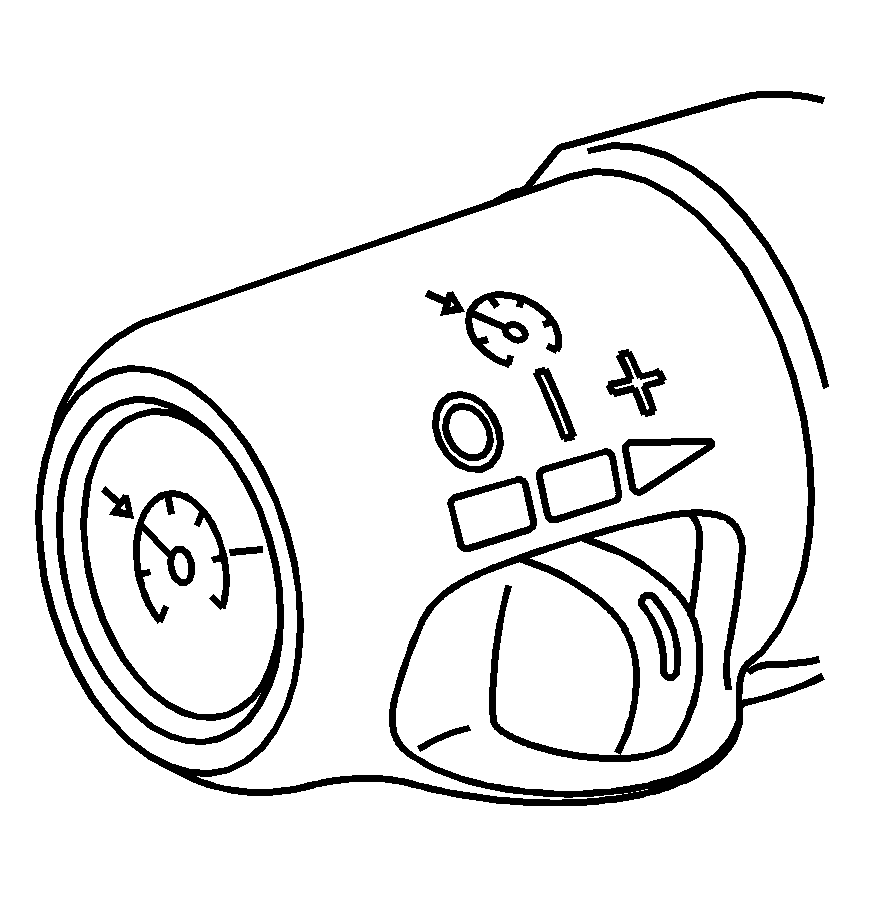
(Off): This position turns the system off.
(On): This position activates the system.+ (Resume/Accelerate): Push the lever to this symbol to make the vehicle accelerate or resume to a previously set speed.
(Set): Press this button to set the speed.
With cruise control, you can maintain a speed of about 25 mph (40 km/h) or more without keeping your foot on the accelerator. This can really help on long trips. Cruise control does not work at speeds below about 25 mph (40 km/h).
If you apply your brakes, the cruise control will shut off.
Caution: Cruise control can be dangerous where you cannot drive safely at a steady speed. So, do not use the cruise control on winding roads or in heavy traffic.
Cruise control can be dangerous on slippery roads. On such roads, fast changes in tire traction can cause excessive wheel slip, and you could lose control. Do not use cruise control on slippery roads.Setting Cruise Control
Caution: If you leave your cruise control on when you are not using cruise, you might hit a button and go into cruise when you do not want to. You could be startled and even lose control. Keep the cruise control switch off until you want to use cruise control.
- Move the cruise control switch to on.
- Get up to the speed you want.
- Press in the set button at the end of the lever and release it.
- Take your foot off the accelerator pedal.
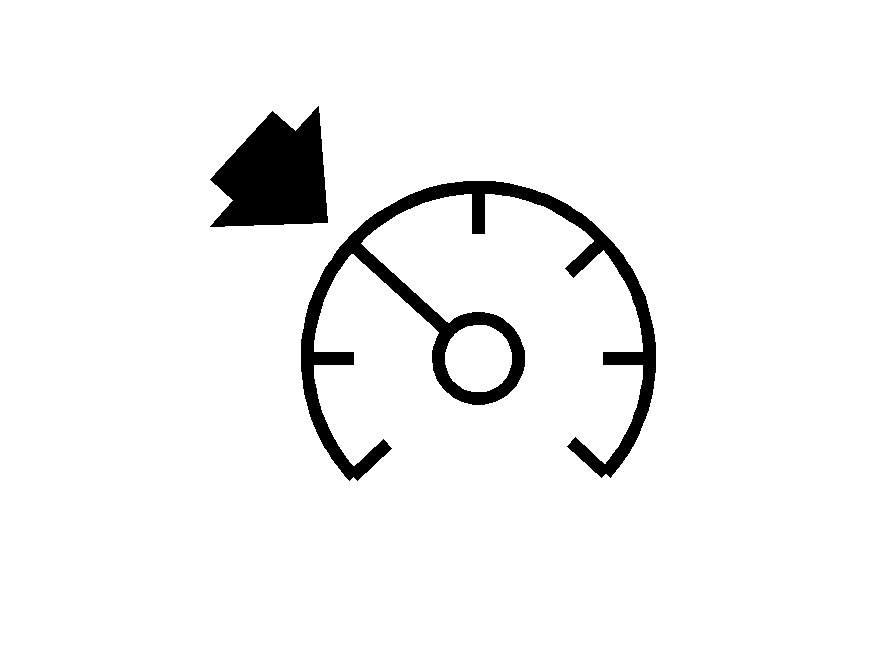
The cruise symbol on the instrument panel will illuminate when the cruise control is engaged.
Resuming a Set Speed
Suppose you set your cruise control at a desired speed and then you apply the brake. This, of course, disengages the cruise control. But you don't need to reset it.
Once you're going about 25 mph (40 km/h) or more, you can move the cruise control switch briefly from on to resume/accelerate.
You'll go right back up to your chosen speed and stay there.
If you hold the switch at resume/accelerate the vehicle will keep going faster until you release the switch or apply the brake. So unless you want to go faster, don't hold the switch at resume/accelerate.
Increasing Speed While Using Cruise Control
There are two ways to go to a higher speed:
| • | Use the accelerator pedal to get to the higher speed. Press the set button at the end of the lever, then release the button and the accelerator pedal. You'll now cruise at the higher speed. If the accelerator pedal is held longer than 60 seconds, cruise control will turn off. |
| • | Move the cruise switch from on to resume/accelerate. Hold it there until you get up to the speed you want, and then release the switch. To increase your speed in very small amounts, move the switch briefly to resume/accelerate. Each time you do this, your vehicle will go about 1 mph (1.6 km/h) faster. |
Reducing Speed While Using Cruise Control
| • | Press in the button at the end of the lever until you reach the lower speed you want, then release it. |
| • | To slow down in very small amounts, briefly press the set button. Each time you do this, you'll go about 1 mph (1.6 km/h) slower. |
Passing Another Vehicle While Using Cruise Control
Use the accelerator pedal to increase your speed. When you take your foot off the pedal, your vehicle will slow down to the cruise control speed you set earlier.
Using Cruise Control on Hills
How well your cruise control will work on hills depends upon your speed, load and the steepness of the hills. When going up steep hills, you may want to step on the accelerator pedal to maintain your speed. When going downhill, you may have to brake or shift to a lower gear to keep your speed down. Of course, applying the brake takes you out of cruise control. Many drivers find this to be too much trouble and don't use cruise control on steep hills.
Ending Cruise Control
There are four ways to turn off the cruise control:
| • | Step lightly on the brake pedal, |
| • | move the cruise control switch to off, or |
| • | shift the transmission to NEUTRAL (N). |
| • | If your vehicle has the Stabilitrak feature, cruise control will turn off if road conditions cause Stabilitrak to activate. |
| • | If the accelerator pedal is held for 60 seconds or longer, cruise control will turn off. |
Erasing Speed Memory
When you turn off the cruise control or the ignition, your cruise control set speed memory is erased.
